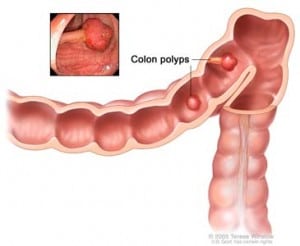Colon and rectal polyps develop when the composition of cells change on the normally smooth lining of the colon. Screening and early diagnosis are the key to avoiding it turning to cancer. 
Importance of a Healthy Colon
The colon (also called the large intestine or large bowel) is a muscular tube that forms the last part of the digestive tract. It absorbs water and stores food waste. The colon is about 4 to 6 feet long and the rectum makes up the last 6 inches. The colon and rectum have a smooth lining composed of millions of cells.
How polyps can develop?
Changes in these cells can lead to the growth of polyps on the lining of the colon. Most are benign (non-cancerous). But over time, polyps can become malignant (cancerous). This occurs when cells in these polyps begin growing abnormally. In time, malignant cells invade more and more of the colon and rectum. The cancer may also spread to nearby organs or lymph nodes or to other parts of the body. Finding and removing polyps can help prevent cancer from ever forming.
What are polyps?
Polyps are fleshy clumps of tissue that form on the lining of the colon or rectum. Small polyps are usually benign (not cancerous). However, over time, cells in a polyp can change and become cancerous. The larger a polyp grows, the more likely this is to happen. Also, certain types of polyps known as adenomatous polyps are considered pre-‐malignant. This means that they will almost always become cancerous if they’re not removed.
Preventing Colorectal Cancer
Colorectal cancers usually start when polyp cells begin growing abnormally. As a cancerous tumor grows, it may involve more and more of the colon or rectum. In time, cancer can also grow beyond the colon or rectum and spread to nearby organs or to glands called lymph nodes. The cells can also travel to other parts of the body. This is known as metastasis. The earlier a cancerous tumor is removed, the better the chance of preventing its spread.
Helpful Links

